Human Flower Project
On the Way to a Prom
Memory and the Proms—Royal Albert Hall’s eight weeks of daily concerts—bring John Levett to London. Happy birthday, with rose ‘heps.’
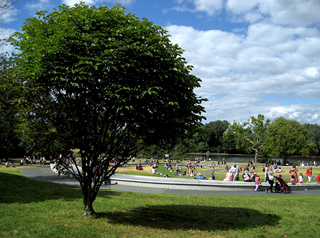
Diana Princess of Wales Memorial Fountain, Hyde Park
Photo: John Levett
By John Levett
Last Thursday was my birthday. I answered mail until noon. It never used to be like this.
The group of photographers that I have the privilege of working with is having its annual show, opening next week and going through to September. We’ve got seventy-five entries this year, our largest number since we began back in 2007. It’s a fine group. We never get bogged down in the technicalities of the process; we’re just there for the images, for the back-story, for the sharing. We’ve got enough energy & enthusiasm for the first timer as for the old pro and sometimes you’ll not know the difference. People keep coming, people keep coming back; that’s always the best judge that something’s right about a group. The mail box keeps growing too.
I once knew the secretary of my local Labour Party in south London. He kept a large bag of pennies & ha’pennies in the bottom draw of his desk. Whenever anyone new came in and asked if they could help out he took out the bag and said: “People keep dropping their small change into our collecting boxes & I never get around to counting it. Do you think that’s something you could do for me?” It never failed. Everyone wants to be useful. So the mail keeps growing and the jobs keep getting done and the show opens and we all wonder at how it got to look so wonderful. The mailbox is the bag of pennies. Everybody gets to be useful.
That’s why you answer mail ’til noon on your birthday.
I broke. Sun was up; I hadn’t noticed. I took a mug of nuclear-strength tea and my book of the month (Austerity Britain by David Kynaston: social history without compare) out to the deckchair under the now-ripening heps of early-aging summer; a chapter read thence to the station.
I can’t read histories on the train. Too many conversations, too much mobile-phoning. Currently my ‘train books’ are re-reads of post-war fiction: Flight into Camden, This Sporting Life, Room at the Top, A Kind of Loving, the ‘London’ trilogy by Colin McInnes. Strange reads; reminders of how much time we spent trying to keep warm; how long London stayed a bomb-site; how we courted. Now King’s Cross: Larkin’s walls of blackened moss still visible in parts.
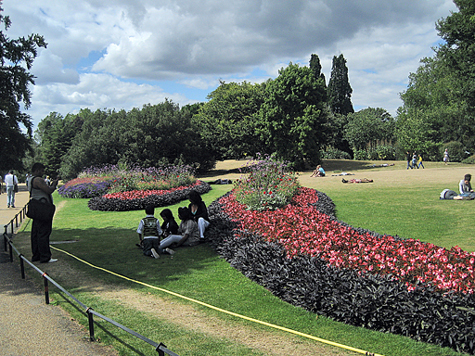
Flower bed, Hyde Park
Photo: John Levett
I take the tube to Green Park and walk through to Hyde Park Corner. My mother used to take me in the pram for rides around the Park. We came back again years later for the history tour. This was the second major thing my mother gave me (the first was reading). History was to be found in museums and Great Houses. A Great House was Apsley House on the edge of the park, once the home (probably amongst others) of the Duke of Wellington, once known as ‘No. 1, London’ (probably by himself). I went there with mum when I was ten and, along with it, the Peninsula War, Napoleon and the 1832 Reform Act (Wellington stayed at home in a hissy fit whist it was being passed). So it went whilst growing-up—house and history.
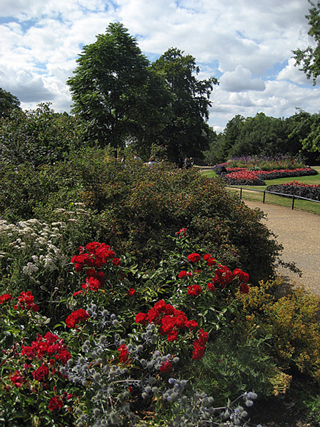 August 2010
August 2010
in the Hyde Park rose garden
Photo: John Levett
Hyde Park always meant the Rose Garden; gran always came with us. Mum was the youngest unmarried daughter in the family (Shock! Horror!) so she got to look after gran along with me. The garden isn’t as spectacular (depending upon taste) as the Queen Mary garden in Regent’s Park but I often walk through it and it always confirms to me what I think about rose gardens. Roses are most memorable as special occasions, as ‘Difficult-to-sleep-the-night-before-seeing-them’ times—the vibrancy of the foliage, the fattening of the buds, the flush, the ‘That’s yer lot!’ The emergence in the last century of the hybrid tea and the so-called floribunda was, probably, a commercial necessity if nurseries were to have any chance of surviving but, for me, they took away the evanescent quality of roses—here today, gone tomorrow, great memory.
This is, of course, a lot of sentimental bunkum on my part. The head gardener of the Malmaison would have given an arm and a leg for a bunch of William Paul’s ‘Ophelia’ and a wall of ‘Paul’s Lemon Pillar’ and if the development of the rose had stopped at the early Teas then its life in the modern garden would have been marginalised. Walking through the park’s rose garden, however, I still think I’ve got a bit of a case.
There’s a sense of falling-off. The roses have passed their first flush and, to speak truth to symbolic power, whenever they’re in that flush they’re never as magnificent as mine. August to me is the month of acceptance—if the garden hasn’t got it now then it’s never going to get it. Plan for next Spring whilst sitting in it and watching the colour change. The gardeners are dead-heading, rifling through the supporting cast to see what might attract attention and clearing space for it. I asked them if this was the boring bit and get a wry smile back. There are some roses that leave the scene gracefully; slowly fading to brown and dangling their heps with swagger. Some, if you’ve pruned after the first flush, are already throwing out next year’s trailers. Mixed plantings in a rose bed have never worked for me—like The Grateful Dead playing intervals for Callas. Gran always liked it though.
I walked out the far end of the garden and on towards Knightsbridge getting reminded that I’m now walking on the ‘Diana, Princess of Wales, Memorial Walk’ which conveniently leads to the ‘Diana, Princess of Wales, Memorial Fountain.’ All these years and still no miracles.
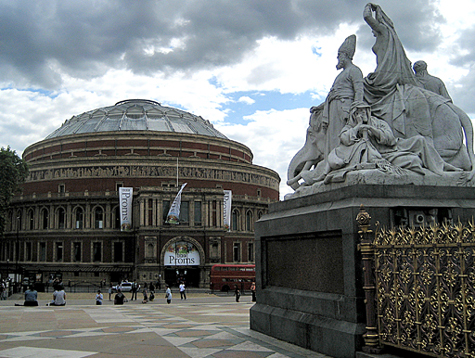
Royal Albert Hall, Prom season 2010
Photo: John Levett
Past the Albert Memorial and there’s the birthday treat. It’s Proms season at the Albert Hall. Mid-July to mid-September for 116 years and only five quid into the arena. In the sixties, when I still lived in London, I went most nights and then dropped off and stayed with radio listening. Now, spending much time again in the capital, I’m catching one or two most weeks. You can buy a seat ticket but the arena’s got the buzz.
It’s got the queuing too. I arrive at half-three and snap the happy soul who’s number one in the queue. I move back along the queue and plump down round about number seventy; it’ll get me in front of the podium. (Two night’s before I was in the late five hundreds.) Cushion, book and bananas. I’m happy.
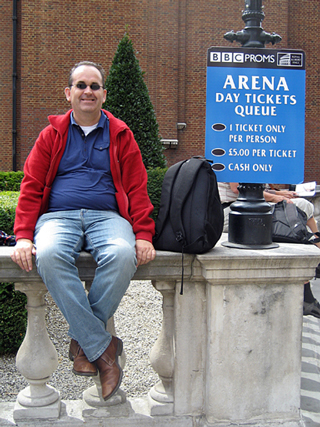 Grinning—the #1 ticket
Grinning—the #1 ticket
Photo: John Levett
There’s never any lack of chat amongst the Prommers. Opinion’s about last night’s Prom, about tonight’s conductor, about tonight’s programme, about the lack of any so-and-so this year, and ‘Did-you-hear?’ After an hour someone comes out of the Hall with a wedge of cloakroom tickets. It means we can go off for a spell and keep the queue place. I walk off to another queue outside the Royal College of Music for a talk on tonight’s concert. It’s this sort of thing that adds to the occasion. There isn’t any organization anywhere that supports classical music in the way that the BBC does in broadcasting, performance, discussion, commissioning, training, teaching, promoting. Classical isn’t the only music in my life but it’s a lot of it and it’s part of my collective experience of humanity.
This evening is a case in point. It’s a performance of Mahler’s fourth and fifth symphonies played by the World Peace Orchestra conducted by Valery Gergiev. This is a special orchestra. It was formed by Georg Solti in 1995 under the prompting of the UN and it is made up of the principal players of the world’s orchestras—Rainer Küchl of the Vienna Phil, Désirée Elsevier of the Met, Gene Pokorny of the Chicago Symphony, Sarah Willis of the Berlin Phil, Nick Woud of the Concertgebouw; players from the Marinsky, Warsaw, Detroit, China, Armenia, São Paulo and so it goes and no egos on show.
There is no composer as expressive of his biography as Mahler; his compositions and his changes of life are transparent; modern composition begins with him; the complexities and conflicts of the twentieth century are embodied within him. When I first listened to Bernstein’s recording of Mahler’s eighth symphony I never knew that music could be so astonishing. I have never seen Gergiev conduct. This evening, nothing disappoints.
Hurrying down Exhibition Road afterwards for the tube I try to memorialise the evening and the day and everything within it so that nothing can be diminished. It’s snap on midnight when my train gets into Cambridge station. Birthday over. Oral history begins.
Comments
many Happy Returns Mr Levett,
may you keep writing…
A wonderful celebration! Happy Birthday, John.


Happy Birthday… John, beautiful words and beautiful pictures…ever inspiring …
Regards
Sandy Ao